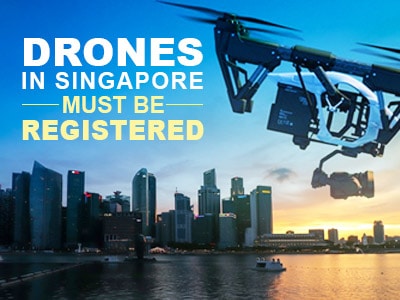Mandatory Registration of Drones in Singapore
 All drones will soon require mandatory registration in Singapore, and failure to do so may result in harsher penalties for pilots.
All drones will soon require mandatory registration in Singapore, and failure to do so may result in harsher penalties for pilots.
Pilots will also be required to abide by a new licensing framework, applicable if they operate larger drones. The registration of drones is likely to take place by the end of the year. There will also be stricter enforcement in place for errant drone operators.
New Regulations Regarding Drones in Singapore
Penalties are also likely to be increased for those who don’t abide by the new rules. The new ruling comes as part of the government’s efforts to increase security and control, following an operational disruption that took place last month at Changi Airport. The new regulations are aimed at ensuring drone operators are fully aware of their responsibilities.
Singapore’s current regulations do not allow any drones to be operational or flying within a 5km radius of any military base or airport in Singapore. Drones are also not permitted to fly at altitudes of more than 61m if they don’t have a permit to do so. Anyone in violation of this rule may be fine up to $20,000 and face a 1-year jail time sentence.
Detecting and Monitoring Drone Activity
Singapore’s current priority is focused on detecting these drones as promptly as possible to prevent disruptions to the air traffic system. Measures to counter these drone activities have been tightened at the airport too.
Detecting drone activity can be a challenging ordeal, particularly when the intentions behind these operations are malicious. The current solutions to prevent these drones from venturing into the restricted territory are still limited, particularly the geofencing technology enforced in the airport. If the technology is going to be effective, the drones must be equipped with the necessary software. This includes software like the Global Positioning System, along with several other navigational satellite signals, which works to prevent drones from automatically flying into or near locations which are sensitive.
There is also a suggestion for a central flight management system which will be able to monitor drones throughout the island. This will make it easier for the relevant authorities to observe if these drones have a valid operational permit. However, this method is only going to be effective with the cooperation of the drone operators themselves.
Singapore’s Civil Aviation Authority has formed an advisory panel to improve the regulatory framework regarding these drones. However, there still needs to be a balance which needs to be achieved for these regulations, and that process is going to take some time, even more so since drone technology tends to evolve and change rapidly.








